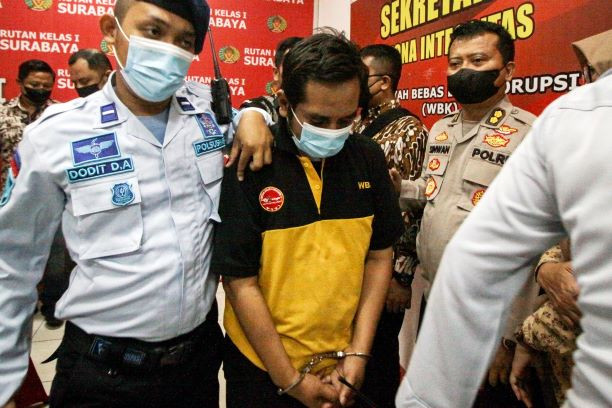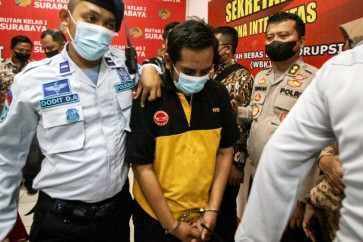Popular Reads
Top Results
Can't find what you're looking for?
View all search resultsPopular Reads
Top Results
Can't find what you're looking for?
View all search resultsHow a 'pesantren' can institutionalize sexual violence
The tariqa tradition typically requires followers to be fully obedient to their teacher or spiritual guide.
Change text size
Gift Premium Articles
to Anyone
 Under arrest: Prison guards and East Java police take Siddiqiyyah pesantren (Islamic boarding school) leader Moch Subchi Azal Tsani (second left) into detention in Medaeng prison in Sidoarjo, East Java, on July 8. Subchi is accused of committing sexual violence against a number of his students. (Antara/Umarul Faruq)
Under arrest: Prison guards and East Java police take Siddiqiyyah pesantren (Islamic boarding school) leader Moch Subchi Azal Tsani (second left) into detention in Medaeng prison in Sidoarjo, East Java, on July 8. Subchi is accused of committing sexual violence against a number of his students. (Antara/Umarul Faruq)
T
he modus operandi of the sexual violence perpetrated by Mohammad Subchi Azal Tsani, also known as Bechi, as reported in the media was to select male and female students to serve as “healthcare personnel” within his pesantren (Islamic boarding school), Shiddiqiyah Ploso, in Jombang, East Java. At least six students – five girls and one boy – have said they experienced physical, sexual and psychological abuse at the school.
My educational background in medical anthropology spurred my curiosity about the “tradition of health” in pesantren. Coincidentally, for my bachelor’s thesis, I joined a Sufi tariqa congregation in a pesantren in West Java by taking a baiat (oath of allegiance) to a spiritual guide who was called Syeikhul Akbar.
This article will explain how sexual violence can become institutionalized in the world of pesantren and particularly at tariqa pesantren – an irony that demands an explanation.
The pesantren in Jombang, founded in 1959, is known as a pesantren of the Shiddiqiyah tariqa, with a number of branches. This pesantren boasts millions of followers across the western part of East Java, known as the Mataraman cultural area, and in Central Java.
Unlike most pesantren in Java, Shiddiqiyah is not affiliated with Nahdlatul Ulama (NU), the country’s largest Islamic organization, but it shares similar religious ritual traditions. In terms of tariqa tradition, Shiddiqiyah is not associated with any of the major global tariqa, which typically have a clear and traceable line of transmission of teachings regarding to whom a teacher of the mystical tradition has pledged allegiance.
The Shiddiqiyah tariqa is a local tariqa organization, whose chain of transmission goes back to its founder Kiai (cleric) Muchtar Mu’thi. He claimed to have been inaugurated directly by the Prophet Muhammad himself as the spiritual leader of the Shiddiqiyah tariqa. This is actually not so surprising, as the basis of the teachings and lineage of any tariqa is the claim that the lineage is linked with the Prophet Muhammad and that understand has been received through dreams or wisik (hearing whispers). The Shiddiqiyah tariqa is a continuation of the small Kedungturi pesantren, which was founded by Mu’thi’s father.
NU recognizes the existence of certain tariqa pesantren within it. The organization of tariqa in the NU tradition is Jam'iyyah Ahlith Thariqah al-Mu'tabarah an-Nahdliyyah (association of tarikat that are legal). Literally, tariqa mu’tabarah means “a path that has legitimacy or is deemed valid to follow”. The pesantren of the Shiddiqiyah tariqa is considered tarekat ghair mu’tabarah – a tariqa outside the association recognized as valid by NU.


















